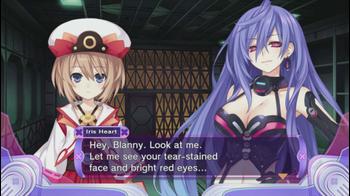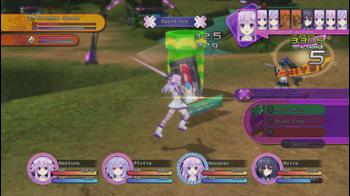
Hyperdimension Neptunia Victory Review
The Hyperdimension Neptunia series was born and nurtured over the past few years. Basing its entire concept around making a mockey of the console wars, While far from perfect, there has been a lot for fans to grab on to for Neptunia to find a pretty substantial audience, becoming second only to Disgaea in terms of popularity.
With its third installment on the PS3 with Hyperdimension Neptunia Victory, the series has never been better. However, that doesn't necessarily mean there still isn't some glaring issues inside.
The story is a little bit of the old with a little bit of the absurd. Neptune is one lazy goddess, and after being chastised by 'Histy' for her poor performance, she decides to finally take things serious (after losing all of her character progress from the previous game). During a particularly bizarre event during an encounter, Neptune finds herself flung back to the beginning of Gameindustri's existence where the battle between Lowee, Leanbox, Lastation, and Planeptune have only just commenced.
You can blame the small budget titles like this one tend to have, but I was practically shocked by how many recycled assets used. Even when it came to very important story missions, there are only a handful of dungeons that players will see throughout the entire game.
Only towards the end were there a couple more to be seen, but even then they felt small and simple. It's almost excruciating having to maneuver through the same environments over and over again even in different parts of the story.
The game also does a rather poor job in explaining its core features. I was never able to fully understand how the scouting system works, which is basically set up to allow you to send hired characters out to different dungeons with the end goal being that they create a new effect for that location, such as increasing the amount of experience gained or unintentionally making the enemies there more difficult. There are a lot of special drops to be obtained to create CDs that are formed using these different materials that can create special armor.
The problem is, none of this is really explained, and it requires a lot of guesswork or deducing, and that tends to be the frustrating part about Compile Heart's work in general. The Quest System also falls flat, weaving in story objectives with random fetch quests that don't provide any sense of challenge.
Fortunately, I didn't play through all three of these games because I enjoyed the gameplay. Really, it was because I had a such great time with everything else. There's a lot to talk about when it comes to the characters. Each and every one of them is extremely likeable in my opinion, even if they do lean very heavily into anime stereotypes. I never got tired of seeing their faces during a cutscene, and even the baddies in the story were pretty good.
The game does a good job in keeping things going at a nice click wthout ruining the story pace - something Mk2 had a lot of problems with. Also, the sheer amount of references used over the course of the game range from the completely obvious to the obscure that only nerds such as myself would get, which I appreciate.
While not all of it was golden, there were plenty of genuinely funny moments, and it was one of the very few RPGs where I actually preferred playing through the English dub version since the voices for the most part were really well done.
The combat is your standard turn-based affair with a combo-based system driven by three different choices of attack: Rush, Power, or Break moves. There are also plenty of special skills to use, including some really over-the-top, screen-filling fireworks that one would expect. I really enjoyed the variety of monsters found in the game, like one called "Tokimeki Sister", which is basically a modelled screenshot from a dating sim that just says, "I love you, big brother".
Even with a lot of the aforementioned issues, there certainly is a lot more polish to be found here, streamlining many of the somewhat frustrating mechanics of previous entries and making things like the combat much more enjoyable and less of a headache.
I also have to point out just how bright and colorful the world is. It's nice to be able to have something that contrasts with most games these days that love to focus on the dark and drab with something as eye-poppingly gorgeous. I am especailly glad that they returned to the 2D portraits after the interesting, but ultimately failed attempt at using only 3D models in Mk2 throughout the story.
Neptunia Victory also marked the first I ever decided to put money down on some DLC to test the waters. After buying a few items from the store, I decided to try out one of the downloadable characters with CC2, the mascot for CyberConnect2 (developers of .hack). I was surprised by the number of voiced scenes the character had, with many deliberate moments of interaction with other cast members during the course of the game. I do wish Nisa was more than just a downloadable character this time around, though.
Even if the game is heavily hampered by the severe laziness when it comes to the level design and poor explanation of mechanics, Victory is still a lot of fun when it comes to the plot and its characters, really the things I care about most in JRPGs. The series doesn't seem to be slowing down any time soon with remakes of the first two games in sight and even some spin-offs (and I really enjoyed the anime), so I'm looking forward to those. It limps all the way to the finish line, but Neptunia Victory is still a pretty enjoyable experience for fans of the genre.

